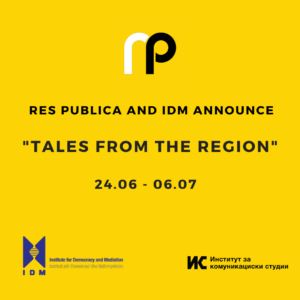A regional blogging initiative on the experience with the COVID-19 Pandemic in the Western Balkans.
 For several months now, the region functions in emergency circumstances caused by COVID-19. To prevent the virus from spreading, governments in the region are taking several measures. Citizens, institutions, and the private sector face a multitude of challenges. We know the situation at home, but how do neighbouring countries deal with the pandemic? What are their challenges? What lessons can we learn from this health (and economic) disaster?
For several months now, the region functions in emergency circumstances caused by COVID-19. To prevent the virus from spreading, governments in the region are taking several measures. Citizens, institutions, and the private sector face a multitude of challenges. We know the situation at home, but how do neighbouring countries deal with the pandemic? What are their challenges? What lessons can we learn from this health (and economic) disaster?
The “Tales from the Region” initiative addresses these questions and more. The initiative consists of organizations and authors from the region (Albania, Bosnia and Herzegovina, Kosovo, Montenegro, Serbia, and North Macedonia). During two weeks (24 June 2020 to 6 July 2020), we will publish each of the institute’s blogs, with the blog on Albania prepared by IDM, authored by Alban Dafa, researcher on governance & security, and Redion Qirjazi, security programme manager, launching on July 1st.
The blogs focus on how COVID-19 attacked the countries in the region, what measures were taken by their local and national authorities and how the citizens reacted to these measures. We will learn from their successes, but also their mistakes.
By sharing their “tales”, we learn about the challenges the region faces in the coming months, and we learn what the “new normal” will look like for all of us.
The initiative “Tales From the Region” is coordinated by Res Publica (North Macedonia) in cooperation with the Institute of Democracy and Mediation (Albania), Analiziraj.ba (BiH), Radio KIM (Kosovo), Sbunker (Kosovo), the civic initiative “Ne Davimo Beograd” (Serbia) and PCNEN (Montenegro). The initiative is implemented within the project “Connecting the Dots: Improved Policies through Civic Engagement”, implemented by the Institute of Communication Studies, with support of British Embassy Skopje.
North Macedonia and COVID-19: The Long-Necked Monster
Author: Anastas Vangeli, lecturer at the ESSCA School of Management and researcher at the ESSCA Institute for EU and Asian Studies.
The trend of putting up walls between states and the shaky confidence in the multilateral order suggests that the pandemic, instead of being resolved as a global crisis, will continue to be resolved as a national crisis in each country of the world. Taking all this into account, COVID-19 is also the biggest test of how much and how successfully Macedonia can act as an independent state in the world that is ever so rapidly changing.
Although many global risk reports indicate infectious diseases as one of the biggest threats to world politics and the economy, in early 2020 few countries in the world were prepared for a global pandemic of a new, hitherto unknown respiratory pathogen such as the novel coronavirus. Even the initial reactions to COVID-19 across many parts of the world seemed to underestimate the situation.
Has Montenegro truly defeated COVID-19?
Author: Ksenija Milovic is a molecular biologist and a member of the main board of the opposition political party in Montenegro – Demos.
On June 2nd, Montenegro declared the end of the epidemic. Coming out of the first wave, the country’s balance was the following: 324 infected and 9 deceased. Now Montenegro is facing economic challenges and there is great uncertainty regarding the tourist season. Initial estimates clearly show that revenues from tourism will be reduced by 70 per cent!
According to relevant experts, a country with a small population, such as Montenegro, and a low population density, has a predisposition to successfully bring the epidemic under control. At the same time of officially confirming the outbreak, the population was bombarded by the media with a tally of casualties, misfortunes and adverse events, as well as daily updated casualty numbers from other European countries (Italy, Spain, Great Britain). This led to a feeling of general trepidation, people wondering when the numbers of the infected and the deceased will rise sharply, i.e. when Montenegro will experience that ominous peak on the chart that shows the progress of the pandemic.
COVID-19 in Bosnia and Herzegovina: games without borders?
Author: Mersiha Drinjaković is a journalist and executive editor of Gracija magazine, and associate of the Analiziraj.ba portal.
How did Bosnia and Herzegovina cope and how is it still coping with the crisis caused by the pandemic? Why didn’t we have a singular state-level crisis headquarters? How were the scandals produced, caused by irregularities and abuse of the system thanks to shortened procedures during the state of emergency? What caused our greatest fears? Will the November elections bring about change, at least at the local level?
Do you remember Game without Borders (the original name was Jeux sans frontieres), that fun show in which the contestants tried to overcome obstacles in an often-funny way? Competitors from 20 countries took part in the Games without Borders between 1965 and 1999, and the curious thing was that the Italian team participated in every show, and Germany was a whopping six-time winner. Why are we bringing up Games without Borders in this context? Well, because in Bosnia and Herzegovina – since the middle of March, we have been involved, not of our own volition, in a show with a similar concept – transformed into real life. Except it’s not fun and there are no medals for participants.
COVID-19 in Serbia: elections more important than public health
Author: Igor Todorović is a journalist specialised in finance and energy on a global level. He follows Balkan topics with an equal focus, with an emphasis on transition and overcoming the consequences of war, migration and emancipation.
Serbia’s state leadership, including a group of MDs who are in the forefront in the fight against the spread of the coronavirus, to say the least, ignored the deterioration of the situation until the voting was over.
To understand the actions of the authorities in Serbia after the COVID-19 outbreak, all one needs to do is look at the developments of the last few days. However, data on how many people were infected, died, were tested and have recovered are “centralized”, i.e. can be obtained only from one place and they are not categorized by location. Journalists have complained, especially after the crisis headquarters stopped holding regular press conferences, of not receiving the required information and explanations. It was especially suspicious that the daily number of new confirmed cases during the two weeks leading up to the June 21st elections changed by only a few cases and from May 22 to June 26 it was announced that either no deaths were recorded to be caused by the virus, or up to one person had died per day.
COVID-19 in Albania: democratic governance put to the test
Authors: Alban Dafa, researcher on governance and security at the Institute for Democracy and Mediation, and Redion Qirjazi, security program manager at the Institute for Democracy and Mediation.
COVID-19 was met with a quick response by the Albanian government, yet, it presented opportunities for the Executive to expand its power by sidelining criticism, dominating public perception, disrupting institutional checks and balances, and ignoring the due democratic process.
On 9 March 2020 Albania recorded its first two cases of COVID-19; two individuals returning from Florence. By July 1, Albania’s official data report a total of 2580 cases, of which 1516 have recovered, 65 patients have died, and 999 cases are still active. In total, 23869 people have been tested.
The Albanian government took a series of steps to prepare for the crises, as shown by some of the internal orders issued by the Ministry of Health and Social Protection, although the public was not made aware of many of them. Some of the preemptive measures included: guidance on preparing against a potential COVID-19 spread (24 January), the establishment of a temporary committee and a Task Force to prevent the spread of Covid-19 (31 January), the preparation of a fully functioning quarantine service (26 February), halting the export of essential medical supplies (8 March).
COVID-19 in Kosovo: one virus and two Prime Ministers
Author: Isak Vorgucic is the executive producer and manager of radio and television “Kim” in Caglavica, Kosovo, since its establishment in 2000.
Less than a month after the easing of restrictive measures, Kosovo is facing a sharp increase in the incidence of coronavirus cases, which is no obstacle for political opponents to deal less with the health and well-being of citizens, and more with the continuation of political skirmishes.
The novel coronavirus, which began its deadly journey in China late last year, arrived in Kosovo in the first half of March. At a time when the virus was starting to break the immunity of Kosovars, political games were afoot behind the scenes, with the aim to tear down the newly elected Government, which did not withstand these blows for a long time, so Kosovo changed two Governments during the entire coronavirus pandemic. Fortunately, they were timed in such a way that the Government that was prone to stricter measures, was in power at the beginning of the pandemic, and the one that was more inclined to relax the measures came towards the end.
COVID-19 and Kosovo: a triple crisis
Author: Edison Jakurti is a PhD Candidate in Economics at the Freie Universität Berlin and was recently appointed Deputy Minister of Economy, Employment, Trade, Industry, Entrepreneurship and Strategic Investments in Kosovo.
If we are to use a single adjective to describe the economic crisis caused by COVID-19, then it is: unprecedented. This is because its scale is global, and the reason is also valid across the world. However, we should keep in mind that it is happening in times of great crises: in capitalism, crises are inherent and almost periodic. Therefore, COVID-19 is more of a spark than a cause of the economic problems we face.
The current economic crisis, although unprecedented, is separated from the past. To put it in other words: there hasn’t been a crisis of this type in the past, but we have constantly witnessed different crises. While this one is unusual, there is space for comparison. For example, some have compared this crisis to a war crisis.



